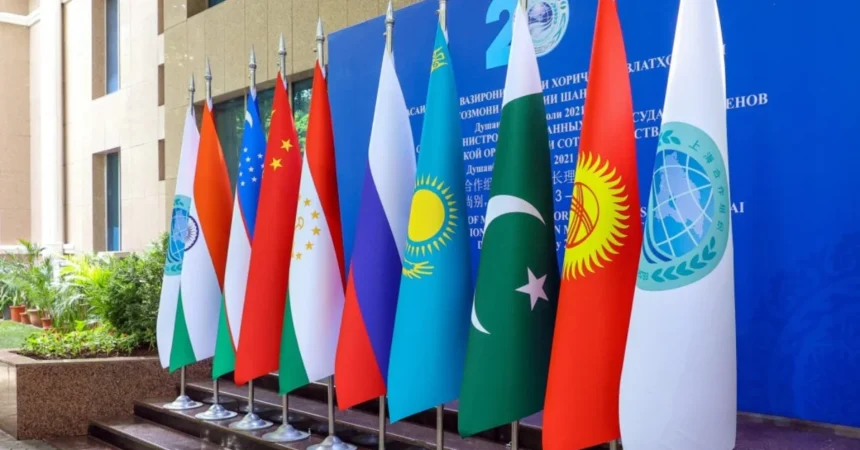Introduction: Afghanistan’s Exclusion from the SCO Summit
Afghanistan’s exclusion from the Shanghai Cooperation Organization (SCO) Summit is raising significant concerns about the nation’s diplomatic future and its position within regional politics. As the world watches Afghanistan struggle to find its footing following the Taliban’s takeover, being left out of such an influential forum could deepen the country’s isolation, both diplomatically and economically.
The decision to exclude Afghanistan has led to widespread speculation about the reasoning behind this move, especially considering the SCO’s mission of promoting regional cooperation in political, economic, and security-related matters. This article will explore the implications of Afghanistan’s absence from the summit, the historical context of its involvement with the SCO, and how this could shape the future of regional diplomacy.
The SCO: A Brief Overview
The Shanghai Cooperation Organization (SCO) is a regional intergovernmental organization founded in 2001. It aims to promote cooperation in various domains, including security, trade, and cultural exchanges among its member states. The SCO’s original members include China, Russia, Kazakhstan, Kyrgyzstan, Tajikistan, and Uzbekistan, with India and Pakistan joining in 2017.
The organization has steadily grown in influence and has become a significant platform for discussing security issues in Central and South Asia, as well as fostering economic partnerships. Afghanistan, while not a member, has long held observer status and has been part of various SCO-related initiatives in the past, especially during its previous government.
Given the SCO’s focus on counterterrorism and regional stability, Afghanistan’s exclusion from the summit has garnered international attention.
The Taliban Regime and Diplomatic Isolation
One of the key reasons behind Afghanistan’s exclusion from the SCO Summit lies in the diplomatic challenges posed by the Taliban regime, which took control of the country in August 2021. Since then, the international community has largely refrained from officially recognizing the Taliban as the legitimate government of Afghanistan.
The Taliban’s stance on human rights, especially concerning women and minorities, as well as its alleged harboring of extremist groups, has led to reluctance among many countries to engage directly with the regime. As a result, Afghanistan has found itself increasingly isolated on the global stage, with few international forums welcoming its participation.
In this context, Afghanistan’s exclusion from the SCO Summit appears to be part of a broader trend of diplomatic distancing. While the Taliban has made attempts to secure international recognition, including reaching out to neighboring countries and attending regional meetings, these efforts have yet to yield significant results.
Regional Security Concerns and the Taliban’s Role
Afghanistan’s geopolitical significance, particularly in terms of regional security, cannot be overstated. The country’s location at the crossroads of Central and South Asia makes it a critical player in matters of regional stability. The rise of extremist groups in Afghanistan, including the presence of ISIS-K, poses significant challenges to neighboring countries, many of which are members of the SCO.
One of the main objectives of the SCO is to combat terrorism, separatism, and extremism, commonly referred to as the “three evils.” Given Afghanistan’s history as a hub for extremist activity, it is likely that the SCO members view the current situation under the Taliban as a potential threat to regional security.
China, Russia, and the Central Asian republics, all key members of the SCO, have expressed concerns about the spread of terrorism and instability from Afghanistan into their territories. These concerns may have played a role in the decision to exclude Afghanistan from the summit, as SCO members grapple with the complexities of engaging with the Taliban while safeguarding their own security interests.
Economic and Diplomatic Implications for Afghanistan
Being excluded from the SCO Summit has significant economic and diplomatic implications for Afghanistan. As a country struggling with economic collapse and humanitarian crises, Afghanistan’s engagement with regional powers is crucial for its recovery. The Taliban regime, which faces sanctions and limited international aid, has sought to develop economic ties with neighboring countries and secure investments in sectors like infrastructure, mining, and trade.
The SCO could have provided a valuable platform for Afghanistan to engage with its neighbors, especially China and Russia, two countries that have shown interest in tapping into Afghanistan’s vast natural resources. However, without an invitation to the summit, Afghanistan misses an opportunity to advance its economic agenda on a regional level.
Diplomatically, Afghanistan’s exclusion from the SCO further isolates the Taliban regime. The SCO has historically served as a bridge between Afghanistan and the broader region, particularly in matters of counterterrorism and economic cooperation. Without access to this platform, the Taliban faces an uphill battle in gaining legitimacy and forging strong diplomatic ties with key regional players.
Afghanistan’s Past Involvement with the SCO
Afghanistan’s relationship with the SCO has evolved over the years, particularly during the tenure of its previous government. As an observer state, Afghanistan actively participated in SCO meetings and initiatives, focusing on counterterrorism, trade, and regional connectivity. The country’s involvement with the SCO was seen as a way to foster stability in the region and integrate Afghanistan into broader economic and security frameworks.
Under the previous Afghan government, there was optimism that the SCO could play a constructive role in Afghanistan’s future, particularly in terms of economic development and counterterrorism efforts. However, the Taliban’s rise to power has disrupted these dynamics, and Afghanistan’s role within the SCO remains uncertain.
The decision not to invite Afghanistan to the 2024 summit marks a significant departure from the past and signals a shift in how the SCO views its relationship with the Taliban regime.
The Role of Key SCO Members in Afghanistan
The positions of China, Russia, and the Central Asian republics are critical in understanding Afghanistan’s exclusion from the summit.
1. China’s Perspective
China has taken a cautious approach to Afghanistan since the Taliban’s takeover. While Beijing has maintained diplomatic channels with the Taliban, it has refrained from offering official recognition. China’s primary concern is security, particularly the potential for extremist groups in Afghanistan to spill over into its Xinjiang region.
China’s Belt and Road Initiative (BRI) presents another dimension to its interests in Afghanistan. Afghanistan’s strategic location makes it an important player in China’s vision for regional connectivity. However, instability and the Taliban’s uncertain governance have made Chinese investments in Afghanistan a risky proposition.
2. Russia’s Stance
Russia, like China, has maintained communication with the Taliban but stopped short of recognizing its government. Russia’s primary concern is the threat of terrorism spilling over from Afghanistan into Central Asia, a region that Moscow considers within its sphere of influence.
Russia’s historical involvement in Afghanistan, dating back to its invasion in 1979, adds a layer of complexity to its relations with the Taliban. Moscow has been careful in balancing its engagement with the Taliban while supporting regional stability initiatives.
3. Central Asian Republics
The Central Asian republics, particularly Tajikistan and Uzbekistan, share borders with Afghanistan and have a vested interest in its stability. These countries have expressed concerns about the rise of extremist groups in Afghanistan and the potential for cross-border terrorism.
While some Central Asian countries have engaged with the Taliban on economic and security matters, they remain wary of the regime’s ability to maintain stability within Afghanistan. The SCO Summit could have served as a forum for these countries to discuss their concerns with Afghanistan, but the exclusion of the Taliban regime leaves these issues unresolved.
Afghanistan’s Future in Regional Diplomacy
The exclusion of Afghanistan from the SCO Summit raises broader questions about its future role in regional diplomacy. As the Taliban continues to seek international recognition, its ability to engage with key regional organizations like the SCO will be crucial for its diplomatic success.
While Afghanistan’s current diplomatic isolation presents significant challenges, there are still opportunities for the country to reintegrate into regional frameworks. The Taliban will need to address the concerns of its neighbors, particularly in terms of security and human rights, if it hopes to regain a seat at the table in organizations like the SCO.
A Missed Opportunity for Afghanistan
Afghanistan’s exclusion from the 2024 SCO Summit highlights the challenges facing the Taliban regime as it seeks to gain international legitimacy. The decision not to invite Afghanistan underscores the complexities of engaging with a regime that has yet to address key concerns related to security, human rights, and governance.
For Afghanistan, the absence from such a significant regional forum represents a missed opportunity to advance its diplomatic and economic interests. As the country navigates its future under the Taliban, its ability to engage with regional organizations like the SCO will be a key determinant of its success on the global stage.
#AfghanistanDiplomacy #SCOSummit #TalibanRegime #RegionalSecurity #DiplomaticIsolation #AfghanistanPolitics #SCO2024 #CentralAsia #Geopolitics







